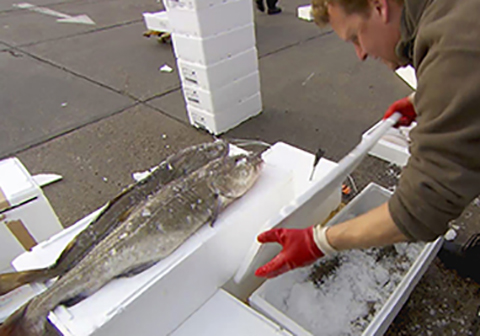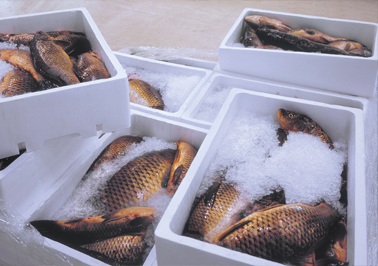Whilst most industries are suffering the effects of the economic downturn, the producers of the humble white polystyrene fish box announce year-on-year production growth of more than 10% as the fish and seafood industry recognise the critical importance of keeping food fresh, safe and reducing food wastage.
The news comes from the EPS group of the British Plastics Federation which comprises the top six manufacturers of polystyrene fish boxes and may also indicate that UK consumers have discovered a renewed appetite for fresh fish from UK consumers as the big supermarkets and television chefs promote the healthy advantages of fish in the diet and weekly fish consumption is predicted to grow from 8 million kg last year to 9.23 million kg by 2030.

Expanded polystyrene (EPS) fish boxes are the globally-preferred transit solution for keeping fish and seafood safe due to their combined high thermal protection and impact resistance. In this role they are a significant contributor to food waste reduction, food safety and hygiene in protecting the 657,000 tonnes of fish landed at UK ports and fish farms. Independent studies by Ecobilan and Price Waterhouse Coopers also reveal the outstanding life cycle credentials of EPS in preserving fish valued at £900 million p.a. on the journey to Britain’s supermarkets, fishmongers, restaurants and shops according to a dedicated web site, www.fishboxes.info.
“The polystyrene fish box deserves its place as the preferred solution for the protection of fish and shellfish. More than 22 million EPS fish boxes are used every year and this has been rising consistently by about 10% per annum for the last few years,” said BPF EPS Group Chairman Tim Wilson.
UK producers of EPS fish boxes came together to produce the web site following separate studies which reveal the life cycle advantages and thermal protection attributes of polystyrene in the fish and fish processing industry. The two new reports are featured on the site along with more details of the environmental credentials of EPS fish boxes.
The independent cradle-to-grave LCA studies by Ecobilan tracked the journey of fish and shellfish for thousands of miles across three European markets. They compared the performance of three alternative fish box materials including polystyrene, waterproofed cardboard and corrugated polypropylene. The studies show that across these markets, in seven of the eight performance indicators, polystyrene was better than or at least comparable to the alternative materials. The full study can be viewed on the web site.
In addition, the web site reveals new thermal performance studies carried out in the UK by Cool Logistics specifically to measure the critical food safety issue of temperature change during typical transits from port to fish counter. These also reveal the superior performance offered by EPS in maintaining the low temperatures essential in keeping fish and fish products safe on their way to our homes and restaurants. The tests, carried out under independent laboratory conditions, simulated the thermal protection offered by waterproofed corrugated carton board and twin-wall corrugated polypropylene compared with EPS. They give convincing evidence that EPS outperforms the alternative materials by providing safe temperatures for up to twice as long.
Tim Wilson concluded, “Over the years, there have been claims that there might be a better packaging solution for fish but this body of research shows that nothing compares to the performance of expanded polystyrene. It’s even been suggested that EPS is not recyclable but thousands of tonnes of polystyrene are recycled every year in the UK. The fact is that collecting fish boxes and cleaning off odours and fish residues has its own environmental and economic impacts. But where it is viable, polystyrene recycling is easy. At Billingsgate Market in London, our EPS fish boxes are recovered every day for processing into long-life applications such as park benches and decking.”































